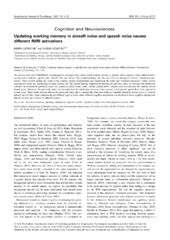Updating working memory in aircraft noise and speech causes different fMRI activations
Peer reviewed, Journal article
Published version

Åpne
Permanent lenke
https://hdl.handle.net/1956/10999Utgivelsesdato
2014-10-28Metadata
Vis full innførselSamlinger
Originalversjon
https://doi.org/10.1111/sjop.12171Sammendrag
The present study used fMRI/BOLD neuroimaging to investigate how visual-verbal working memory is updated when exposed to three different background-noise conditions: speech noise, aircraft noise and silence. The number-updating task that was used can distinguish between “substitution processes,” which involve adding new items to the working memory representation and suppressing old items, and “exclusion processes,” which involve rejecting new items and maintaining an intact memory set. The current findings supported the findings of a previous study by showing that substitution activated the dorsolateral prefrontal cortex, the posterior medial frontal cortex and the parietal lobes, whereas exclusion activated the anterior medial frontal cortex. Moreover, the prefrontal cortex was activated more by substitution processes when exposed to background speech than when exposed to aircraft noise. These results indicate that (a) the prefrontal cortex plays a special role when task-irrelevant materials should be denied access to working memory and (b) that, when compensating for different types of noise, either different cognitive mechanisms are involved or those cognitive mechanisms that are involved are involved to different degrees.
